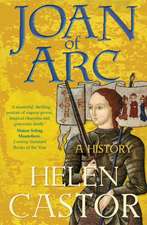A Distant Mirror: The Calamitous 14th Century
Autor Barbara Tuchmanen Limba Engleză Paperback – 4 oct 2017
Here, Barbara Tuchman masterfully reveals the two contradictory images of the age, examining the great rhythms of history and the grain and texture of domestic life as it was lived: what childhood was like; what marriage meant; how money, taxes and war dominated the lives of serf, noble and clergy alike.
Granting her subjects their loyalties, treacheries and guilty passions, Tuchman recreates the lives of proud cardinals, university scholars, grocers and clerks, saints and mystics, lawyers and mercenaries, and, above all, knights. The result is an astonishing reflection of medieval Europe, a historical tour de force.
Preț: 74.39 lei
Preț vechi: 97.73 lei
-24% Nou
14.24€ • 14.81$ • 11.75£
Carte disponibilă
Livrare economică 27 martie-02 aprilie
Livrare express 07-13 martie pentru 55.86 lei
Specificații
ISBN-10: 0241972973
Pagini: 784
Dimensiuni: 129 x 198 x 47 mm
Greutate: 0.55 kg
Editura: Penguin Books
Colecția Penguin
Locul publicării:London, United Kingdom
Notă biografică
Barbara Tuchman achieved prominence as a historian with The Zimmerman Telegram and international fame with the Pulitzer-Prize winning The Guns of August. She is also the author of The Proud Tower, Stilwell and the American Experience in China (also awarded the Pulitzer Prize), A Distant Mirror and The March of Folly. She died in 1989. The Guns of August and The Proud Tower are published by Penguin.
Recenzii
Wise, witty, and wonderful. . . a great book, in a great historical tradition
Beautifully written, careful and thorough in its scholarship . . . What Ms. Tuchman does superbly is to tellhowit was. . . .No one has ever done this better
Descriere
The fourteenth century was a time of fabled crusades and chivalry, glittering cathedrals and grand castles. It was also a time of ferocity and spiritual agony, a world of chaos and the plague.
Here, Barbara Tuchman masterfully reveals the two contradictory images of the age, examining the great rhythms of history and the grain and texture of domestic life as it was lived: what childhood was like; what marriage meant; how money, taxes and war dominated the lives of serf, noble and clergy alike.
Granting her subjects their loyalties, treacheries and guilty passions, Tuchman recreates the lives of proud cardinals, university scholars, grocers and clerks, saints and mystics, lawyers and mercenaries, and, above all, knights. The result is an astonishing reflection of medieval Europe, a historical tour de force.









